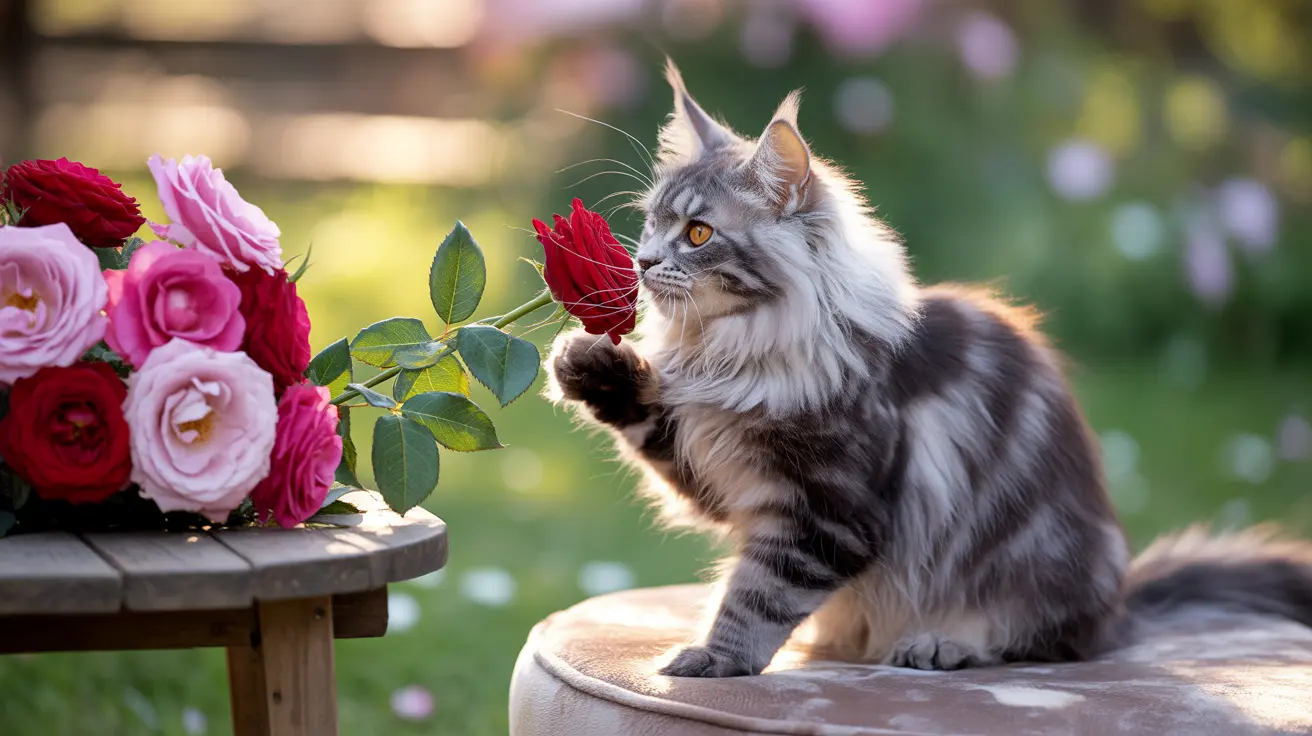As a cat parent, you want to ensure your home environment is safe for your feline friend. When it comes to roses – a popular flower found in many homes and gardens – it's natural to wonder about their safety. Let's explore everything you need to know about roses and their potential effects on cats.
The good news is that true roses (Rosa species) are not toxic to cats. However, there are some important considerations and precautions to keep in mind to ensure your cat's safety around these beautiful blooms.
Understanding Rose Safety for Cats
True roses, belonging to the genus Rosa, are officially classified as non-toxic to cats by the ASPCA and other leading veterinary organizations. This includes all varieties of roses – from classic hybrid teas to climbing roses and miniature varieties.
The non-toxic status applies to several parts of the plant:
- Rose petals
- Rose leaves
- Rose stems
- Rose hips
Potential Risks Despite Non-Toxicity
Physical Hazards
While roses aren't poisonous, they can still pose physical risks to curious cats:
- Sharp thorns can injure paws, mouths, and eyes
- Stems can cause scratches or puncture wounds
- Fallen thorns might be stepped on or swallowed
Chemical Concerns
Store-bought or garden roses may carry additional risks:
- Pesticide residues
- Fertilizer chemicals
- Floral preservatives
- Plant food additives
Watch Out for "False Roses"
Some plants with "rose" in their name are actually toxic to cats:
- Christmas Rose (Helleborus niger)
- Desert Rose (Adenium obesum)
- Rose of Sharon (Hibiscus syriacus)
- Moss Rose (Portulaca grandiflora)
Signs of Rose-Related Issues in Cats
Digestive Symptoms
If your cat nibbles on rose petals or leaves, they might experience:
- Mild stomach upset
- Temporary vomiting
- Brief episodes of diarrhea
- Decreased appetite
Signs of Thorn Injury
Watch for these indicators of physical injury:
- Pawing at mouth or face
- Limping
- Visible cuts or scratches
- Swelling around injured areas
- Blood on fur or paws
Safe Rose Practices for Cat Owners
Follow these guidelines to keep your cat safe around roses:
- Remove thorns from cut roses
- Keep arrangements out of easy reach
- Clean roses thoroughly before bringing them inside
- Choose organically grown roses when possible
- Monitor your cat's behavior around plants
Frequently Asked Questions
Are roses toxic to cats or safe for them to be around?
Genuine roses (Rosa species) are not toxic to cats. However, cats should still be monitored around roses due to physical hazards like thorns and potential chemical treatments on the plants.
Can rose thorns harm my cat even if the flower itself isn't poisonous?
Yes, rose thorns can cause significant harm to cats. They can puncture skin, injure eyes, or cause internal damage if swallowed. Always remove thorns from accessible roses.
What symptoms should I watch for if my cat eats rose petals or leaves?
Watch for mild digestive upset like vomiting or diarrhea. These symptoms usually resolve on their own within 24 hours. If symptoms persist or worsen, contact your veterinarian.
Are there any "rose" plants that look similar but are toxic to cats?
Yes, several plants with "rose" in their name are toxic to cats, including Christmas Rose, Desert Rose, and Rose of Sharon. Always verify the scientific name (Rosa species) before bringing plants home.
How can I keep my cat safe when having roses or cut flowers at home?
Remove thorns, clean flowers thoroughly, keep arrangements out of easy reach, and monitor your cat's behavior around the plants. Choose organic roses when possible to avoid chemical residues.
Conclusion
While roses themselves aren't toxic to cats, responsible pet ownership means taking precautions to prevent physical injuries and exposure to chemicals. By following the safety guidelines outlined above, you can enjoy these beautiful flowers while keeping your feline friend safe and healthy.






